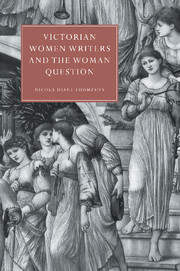Book contents
- Frontmatter
- Contents
- List of illustrations
- Notes on contributors
- 1 Responding to the woman questions: rereading noncanonical Victorian women novelists
- 2 Marriage and the antifeminist woman novelist
- 3 Breaking apart: the early Victorian divorce novel
- 4 Phantasies of matriarchy in Victorian children's literature
- 5 Gendered observations: Harriet Martineau and the woman question
- 6 Maximizing Oliphant: begging the question and the politics of satire
- 7 Literary women of the 1850s and Charlotte Mary Yonge's
- 8 Portraits of the artist as a young woman: representations of the female artist in the New Woman fiction of the 1890s
- 9 Lady in green with novel: the gendered economics of the visual arts and mid-Victorian women's writing
- 10 Ouida and the other New Woman
- 11 Organizing women: New Woman writers, New Woman readers, and suffrage feminism
- 12 Shot out of the canon: Mary Ward and the claims of conflicting feminism
- 13 E. Nesbit and the woman question
- 14 “An ‘old-fashioned’ young woman”: Marie Corelli and the New Woman
- CAMBRIDGE STUDIES IN NINETEENTH-CENTURY LITERATURE AND CULTURE
6 - Maximizing Oliphant: begging the question and the politics of satire
Published online by Cambridge University Press: 01 March 2010
- Frontmatter
- Contents
- List of illustrations
- Notes on contributors
- 1 Responding to the woman questions: rereading noncanonical Victorian women novelists
- 2 Marriage and the antifeminist woman novelist
- 3 Breaking apart: the early Victorian divorce novel
- 4 Phantasies of matriarchy in Victorian children's literature
- 5 Gendered observations: Harriet Martineau and the woman question
- 6 Maximizing Oliphant: begging the question and the politics of satire
- 7 Literary women of the 1850s and Charlotte Mary Yonge's
- 8 Portraits of the artist as a young woman: representations of the female artist in the New Woman fiction of the 1890s
- 9 Lady in green with novel: the gendered economics of the visual arts and mid-Victorian women's writing
- 10 Ouida and the other New Woman
- 11 Organizing women: New Woman writers, New Woman readers, and suffrage feminism
- 12 Shot out of the canon: Mary Ward and the claims of conflicting feminism
- 13 E. Nesbit and the woman question
- 14 “An ‘old-fashioned’ young woman”: Marie Corelli and the New Woman
- CAMBRIDGE STUDIES IN NINETEENTH-CENTURY LITERATURE AND CULTURE
Summary
In one of Margaret Oliphant's most popular novels, Phoebe Junior: A Last Chronicle of Carlingford (1876), Reginald, the high-minded older son of a widowed clergyman with a large and impoverished family refuses a “sinecure” on the grounds that it means pay without work, that is, a generous stipend without any duties attached to it. His sister, Ursula, the daughter saddled with the bulk of the household work and poignantly wishing that there were sinecures for girls, argues convincingly, “‘They pay you for that which is not work, but they will find you plenty of work they don't pay for’” (Phoebe Junior, p. 112). Ursula intends merely to persuade Reginald to accept familial financial responsibility, a theme Oliphant repeatedly varies: her fiction is punctuated by a brood of feckless and insolvent fathers just as her autobiography turns on her struggle to support an increasingly large family in the wake of her financially encumbered husband's death and her brother's alcoholism.
Ursula's wish for sinecures for girls articulates an interesting fantasy about female work and its relationship to earnings. In being an object of envy for both Northcote, the Dissenting minister who has a salary but no poor people in his comfortable congregation to tend, and for Ursula, for whom a salary would provide her father with irrefutable proof of her contribution to the household he takes for granted, Reginald's vocational condition stresses the importance of work and the importance of pay without endorsing any notion of paid work.
- Type
- Chapter
- Information
- Victorian Women Writers and the Woman Question , pp. 99 - 115Publisher: Cambridge University PressPrint publication year: 1999
- 2
- Cited by



